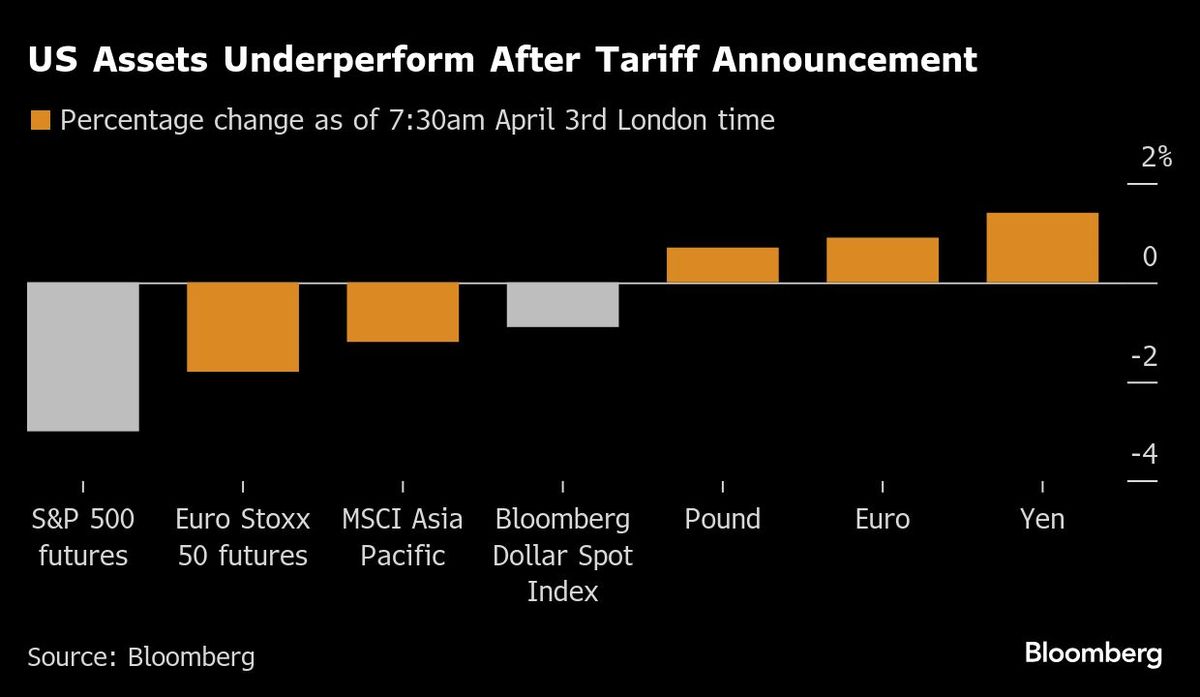
(April 3): Donald Trump’s shake-up of the global trading system is hurting US assets more than those in many of the big economies he has just slapped with additional tariffs.
US equity index futures tumbled more than 4% after the US president announced a sweeping series of tariffs following the market close on Wednesday, and a gauge of the dollar slumped. But the impact elsewhere was less extreme. A broad gauge of Asian stocks was down 1.7% at its lowest. European futures fell 2.4% before paring some of their losses.
The widespread sell-off in global markets makes clear that investors don’t expect any winners from the latest — and by the far the largest — salvo in a growing trade war. But they also suggest the US itself might be one of the biggest victims of Trump’s protectionist policies.
“The narrative is moving from US exceptionalism to US alienation,” said Kok Hoong Wong, head of institutional equities sales trading at Maybank Securities in Singapore.
The dollar headed for one of its worst days of the year, as traders prepared for the economic impact. The Japanese yen gained 1.5% against the greenback, while the euro rose more than 1%. Treasury 10-year yields hit their lowest level since October, further weighing on the dollar.
“The aggravation of US growth concerns on the tariff news and related further falls in US stocks has meant that the dollar isn’t enjoying its traditional safe-haven, reserve currency status support,” said Ray Attrill, head of foreign-exchange strategy at National Australia Bank Ltd.
The tariff announcement has put more pressure on a US stock market that had already floundered this year, as investors braced for Trump’s policies to stir up inflation and raise the odds of a recession in the world’s largest economy. The S&P 500 was down 3.6% this year before the tariff announcement, while the Nasdaq 100 had shed 7%. The Magnificent Seven tech stocks have tumbled.
The announced tariffs increase the risk of “damage to consumer and business confidence” that could endure even if levies are eventually rolled back, Scott Chronert, head of US equity strategy for Citigroup, said in a note. The investment bank expects to cut its outlook for US stocks, he said.
Read also:
Trump's tariffs stoke global trade war as China, EU vow response
Here are Trump’s reciprocal tariffs by country
Uploaded by Magessan Varatharaja
- SumiSaujana slumps on ACE Market, on course to be worst IPO debut
- Asian stocks tumble again as US hits China with 104% tariffs, Treasuries slammed
- Malaysian palm oil producers could capture US market share from Indonesia with better pricing — CGS International
- Malaysian stocks broadly lower as Trump’s reciprocal tariffs come into force
- Lawyer launches constitutional challenge against Judicial Appointments Commission's judge appointment power
- UK borrowing costs hit highest since 1998 amid global bond rout
- China says it does not want trade war but will fight US tariff hikes
- Witness protection unit DG challenges order to testify in 1MDB-Tanore trial
- 1MDB withdraws suit against Singaporean Shabnam in US$346m Rosmah luxury goods case
- WTEC Group braves global market rout, launches ACE Market IPO to raise up to RM33m

